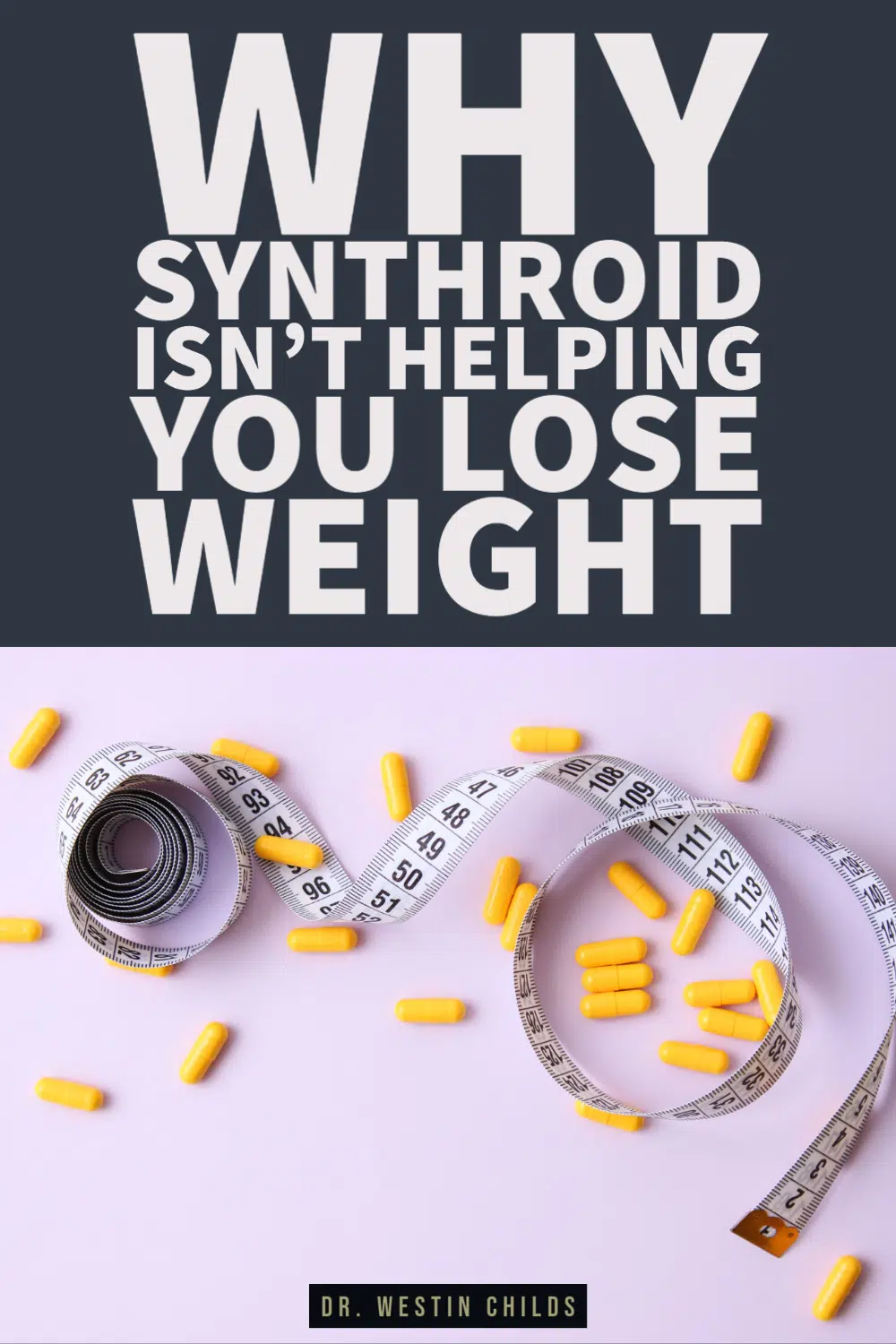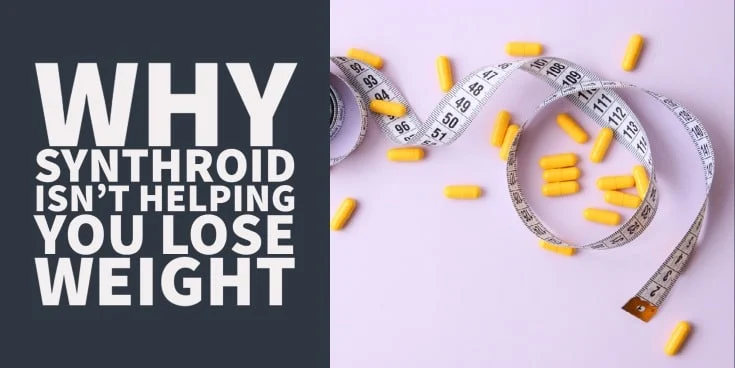Are you on the thyroid medication Synthroid and not losing weight?
If so you aren’t alone…
Synthroid is one of the most commonly prescribed medications for patients who have hypothyroidism but here’s the problem:
Not everyone does well on this medication.
Their bodies don’t absorb it, they don’t convert T4 to T3 or they need more T3 due to other problems.
Despite this, almost every patient is given Synthroid, levothyroxine, or other T4 medications and many of you are still dealing with weight issues.
And I want to share with you some reasons why that may be the case.
It turns out that the thyroid is certainly involved in maintaining your metabolism and can lead to weight gain if you are hypothyroid – that much is true.
But did you know that simply replacing thyroid hormone in your body with medications like levothyroxine and Synthroid often isn’t enough to help you lose weight?
In this post, I’m going to talk about the reasons why Synthroid isn’t helping you with weight loss and what to do about it.
Understanding Thyroid Function and Weight Gain vs Weight Loss
This part can get confusing for many patients.
Does hypothyroidism cause weight gain?
The answer is definitely yes, but why it causes weight gain is a little more complex.
Your thyroid helps to control and contribute to your resting metabolic rate (1) (AKA resting energy expenditure) otherwise known as metabolism.
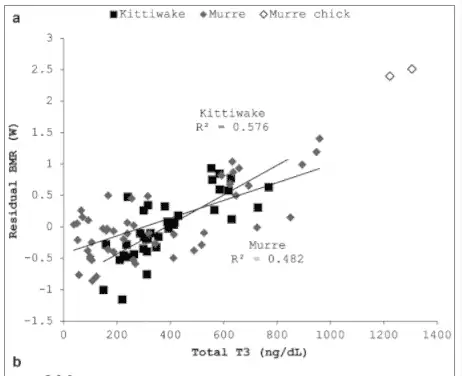
Studies have shown that your basal metabolic rate is correlated with total T3 levels and therefore your ability to convert T4 to T3.
So when you have hypothyroidism or low thyroid hormone, your metabolism will suffer.
Slow metabolism = weight gain
That’s why one of the common side effects of hypothyroidism is low body temperature and cold hands/feet.
As your metabolism slows you produce more energy which means you produce less heat.
Less heat = colder body temperatures = slow metabolism
But that isn’t the only way that hypothyroidism can cause weight gain.
Believe it or not, your thyroid also influences other hormone systems in your body.
Here’s an example of what can happen to your hormones when you have hypothyroidism:
- Progesterone levels may fall leading to estrogen dominance and weight gain in the hips, butt, and thighs (low progesterone may also contribute to infertility)
- Cortisol levels increase causing weight gain in the abdomen
- Insulin levels increase leading to abdominal fat
- Leptin levels may increase causing weight loss resistance
- Testosterone levels may change as sex hormone-binding globulin falls
So what happens is as thyroid hormone falls you get hit with a double whammy:
Hypothyroidism leads to a slowing of your metabolism and causes other hormone imbalances which then lead to further weight gain.
The big problem is that simply fixing your hypothyroidism by replacing thyroid hormone with Synthroid or levothyroxine does NOT fix the other hormone problems.
It may resolve your hypothyroid symptoms like hair loss, fatigue, and brain fog – but it usually doesn’t lead to weight loss.
Why?
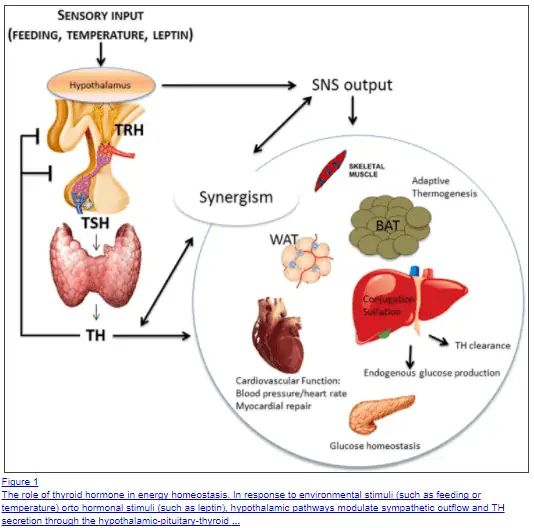
Because the other hormone problems still persist!
But what about the weight gain from hypothyroidism itself? Does getting on medication help at least a little bit?
Yes, but not a lot.
If you are going to lose weight after getting on Synthroid or levothyroxine it will only be about 5-15 pounds at most.
That’s because the thyroid usually only contributes that much to your total weight.
If you are 50+ pounds overweight then 15 pounds may be from your thyroid, 30 may be from insulin resistance, 10 may be from estrogen levels or cortisol levels, etc.
Weight gain and weight loss are much more complex than just eating less and exercising more and hoping that everything will “work itself out”.
The bottom line?
If you are going to lose weight when you add Synthroid or levothyroxine it will only be a small amount IF the medication is right for you.
What’s more is that due to other mechanics in your body, the addition of T4-only medications like Synthroid and levothyroxine can actually lead to weight GAIN.
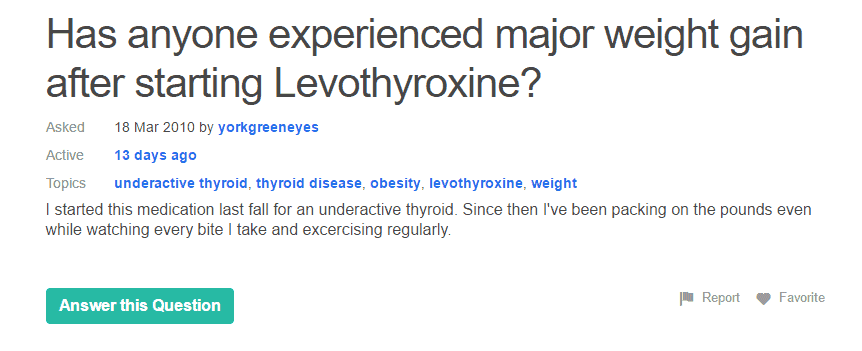
It may not make sense now, but we are going to discuss below how that happens.
Hint: it has to do with T4 to T3 conversion.
You can read more about how levothyroxine causes weight gain here.
DOWNLOAD FREE RESOURCES
Foods to Avoid if you Have Thyroid Problems:
I’ve found that these 10 foods cause the most problems for thyroid patients. Learn which foods you should avoid if you have thyroid disease of any type.
The Complete List of Thyroid Lab tests:
The list includes optimal ranges, normal ranges, and the complete list of tests you need to diagnose and manage thyroid disease correctly!
Does Synthroid Cause Weight Loss?
So the big question is this:
Does Synthroid actually cause weight loss?
The answer is that it CAN, but unfortunately for most patients, it most likely will NOT cause significant weight loss.
Why?
In order to understand we need to talk about the basics of thyroid function.
If you have a decent understanding of thyroid function feel free to skip this part, but if you are a beginner please pay close attention.
First:
There are 3 forms of thyroid hormone floating around in your body…
- T4 –> This is the reservoir form of thyroid hormone but is NOT active by itself. Synthroid and levothyroxine are T4-containing medications only – which means they are NOT active by themselves. T4 can either turn into T3 (which we want) or Reverse T3 (which we don’t want) depending on the circumstances in the body.
- T3 –> This is the ACTIVE thyroid hormone in your body. NDT and Cytomel/Liothyronine are medications that contain either some T3 or all T3. Your body makes some T3 from the thyroid gland but most are converted from T4 hormone.
- Reverse T3 –> This is the INACTIVE thyroid metabolite in your body. This acts as a natural brake mechanism for your body in case you are experiencing illness, chronic inflammation, or trauma. Your body will turn T4 into Reverse T3 if it needs or wants to put the brakes on your metabolism.
So when we are talking about Synthroid we have to remember that this medication contains only T4 thyroid hormone.
That means by itself levothyroxine is essentially an inactive form of thyroid hormone (2), but it has the potential to become active if conditions are perfect.
So when your Doctor gives you Synthroid or levothyroxine he/she is making the assumption that your body will have no problem turning the T4 in Synthroid into the active T3 thyroid hormone in your body.
Now, this sounds good, except when you consider this:
If conditions are not perfect then your body is just as likely to convert that T4 hormone into the inactive metabolite reverse T3 (3) thereby making your thyroid function WORSE.
So what causes your body to convert T4 to T3 and T4 to reverse T3?
All of these factors increase T4 to reverse T3 conversion (exactly what you DON’T want):
- Chronic inflammation or autoimmune disease
- Hormone imbalances like insulin resistance and leptin resistance
- Nutrient deficiencies (see this post for more info on the 13 nutrients required for proper thyroid hormone function)
- Chronic infection (Viral, bacterial, or parasitic)
- Calorie-restricted diets (4) and yo-yo diets
- Certain medications: Beta-blockers, antihypertensives, anti-seizure medications, diabetic medications, and antidepressants
So, take a look at that list and ask yourself if you have any of those conditions.
You probably have 2 or more if we are just going off of statistics here.
The point is this:
If you have any of those conditions and you’re taking levothyroxine or Synthroid then there is a good chance you might be converting your T4 into reverse T3 instead of T3.
So let’s put this into perspective…
If you’re taking levothyroxine or Synthroid (T4 only medication) and your body is turning it into the antithyroid metabolite which can blunt thyroid function (5) it’s possible for these medications to lead to weight GAIN instead of weight LOSS.
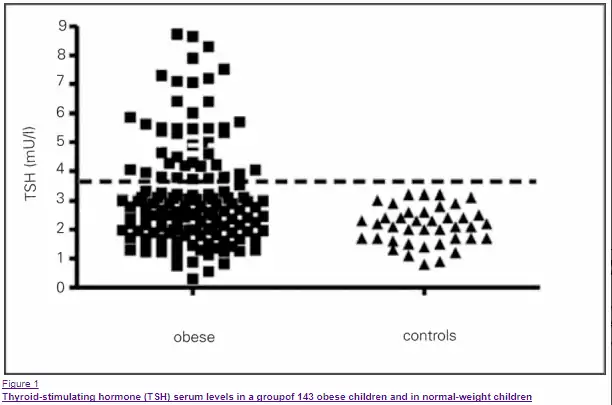
This isn’t to say that it will have this effect on every person, because that’s certainly not the case.
In fact, most people do still need some T4 medication, the problem is that they also need pure T3 medication and most doctors don’t frequently prescribe T3-containing medications.
The amount of T3 that you need depends generally on how many chronic medical problems you have or how sick you are.
The sicker the patient, the more T3 they generally need.
If your plan is to take Synthroid or levothyroxine for weight loss and you aren’t hypothyroid then you are most certainly out of luck.
Because even if you have hypothyroidism it’s NOT likely to cause significant weight loss by itself (6), except for certain circumstances.
Studies have shown that even taking suppressive doses of LT4 (levothyroxine) to lower the TSH does NOT result in weight loss.
But this study did show that lowering the TSH did slightly increase the basal metabolic rate of women, but not enough to normalize free T3 levels.
How Long Before Synthroid Helps with Weight Loss?
So why is it that some people are able to lose weight on Synthroid while other patients don’t lose any weight and some very unlucky patients actually gain weight on it?
The answer generally has to do with thyroid conversion (as we mentioned above) and some of that appears to be genetic, while the rest highly depends on other factors like those listed above.
But what about those lucky few people who do lose weight on Synthroid, how long does it take for this to happen?
Or maybe you just recently started taking the medication, how long should you expect to be on it before you start losing weight and/or feeling better?
If Synthroid is going to work for you, then two things have to happen:
1. You need to be actively converting T4 to T3 (If you know you aren’t converting T4 to T3 you can learn more about how to increase this conversion process naturally here)
2. And you need to be on a high enough dose for your body (You can learn more about how to determine if your dose is adequate here)
If both of these conditions are met then you should expect to notice an improvement in your symptoms within 4-8 weeks.
It’s a good sign if you noticed ANY improvement while taking Synthroid or levothyroxine even if you haven’t lost any weight.

It’s a sign that your body both needs and can actually use the T4 medication.
It doesn’t necessarily mean you don’t need T3 medication, but it’s a sign that T4 is part of that equation.
Weight loss after starting thyroid medication generally comes a little bit later.
Before you lose weight you should be noticing some improvement in your symptoms, things as an increase in energy, a decrease in hair loss, a decrease in constipation, etc.
If you’ve been on Synthroid or levothyroxine for months to years and you haven’t noticed any difference then it isn’t like you are going to lose weight by simply increasing your dose.
But let’s say you are on a high enough dose and you are converting well enough and you still aren’t losing weight…
What then?
Synthroid vs NDT vs T3 for Weight Loss
If you didn’t already know there are more medications for your thyroid than Synthroid or levothyroxine.
- Natural Desiccated Thyroid (Armour thyroid, WP thyroid, Naturethroid) = T4 + T3 in about an 80/20 ratio (still contains more T4 than T3)
- Levothyroxine and Synthroid = T4 medication only (the inactive form of thyroid hormone)
- Cytomel and Liothyronine = T3 hormone (the active form of thyroid hormone)
There are formulations of both T4 and T3 hormones that are porcine-derived known as Natural Desiccated thyroid.
There is also a medication that contains T3 only (the active thyroid hormone) known as Cytomel or liothyronine.
You’ve probably heard that these medications are “better” for thyroid patients.
And there is certainly some truth to that statement, but it’s more complicated than just saying one is better than the other.
In my experience, most patients do not do well on Synthroid, levothyroxine, or other T4-only medications.
But it’s also not uncommon for me to see patients on high doses of NDT who still feel very poorly and still can’t lose any weight.
So, which of the thyroid medications is best for weight loss?
You obviously want to take whatever is best for YOUR body, but generally the more T3 in the thyroid medication the more effective it will be for weight loss.
That doesn’t mean it causes weight loss directly, instead, it’s probably more related to the fact that your body is finally able to use the active thyroid hormone because you are no longer providing competition through reverse T3.
The truth is if you’re having issues with T4 medications then you will most likely need some form of active thyroid hormone (T3) to actually help you with weight loss.
So let’s consider how to use these medications and under what circumstances…
Patients that do well on Synthroid and T4-only medications:
- Patients who have never been on thyroid medications before
- Patients who are extremely sensitive to T3-containing medications
- Patients who are very sensitive to other medications and supplements
- Patients who have no other chronic illnesses or medical conditions
- Patients who have noticed weight loss or other improvements while on T4 medications within 4-8 weeks of taking the medication and are at an appropriate dose
Patients who do well on NDT and other forms of T4 + T3 combos:
- Patients who have never been on thyroid medication before
- Patients with minor to moderate insulin and leptin resistance
- Patients with 20-40 pounds to lose (not morbidly obese patients)
- Patients with some chronic medical conditions
- Patients who have failed T4-only medications like Synthroid or levothyroxine
- Patients who are too sensitive to T3-only medication or have severe adrenal issues
Patients who do well on T3-only medications like Cytomel and Liothyronine:
- Patients with multiple chronic medical conditions
- Patients with severe insulin resistance and leptin resistance
- Patients with severe weight loss resistance or who are morbidly obese
- Patients who have very high reverse T3 levels (> 30)
- Patients who have failed T4-only medications
- Patients who show some improvement on NDT but who did not experience weight loss or who are still symptomatic
How to make your Synthroid more Effective
Another alternative to switching thyroid medication is to take steps to increase the effectiveness of the Synthroid you are already taking.
You can do this through 3 steps which I will outline below:
#1. Increase T4 to T3 conversion through supplements
You can increase T4 to T3 conversion by reducing inflammation, providing your body with both zinc and selenium and taking certain nutrients.
Nutrients like rosemary and guggul extract have been shown in studies to help naturally improve T4 to T3 conversion which may result in higher total T3 levels in people who take it.
In addition, anti-oxidants, anti-inflammatory agents, and adaptogens such as ashwagandha may also enhance thyroid conversion indirectly.
Lastly, improving gut function may also improve thyroid conversion as up to 20% of thyroid conversion takes place in the gut (you can do this by simply taking probiotics to reduce inflammation and enhance intestinal bacteria diversity).
You can learn more about using supplements to increase peripheral thyroid conversion here.
#2. Maximize thyroid hormone biosynthesis
Maximizing thyroid hormone biosynthesis refers to optimizing the amount of thyroid hormone that your body produces naturally.
If you are suffering from Hashimoto’s or certain nutrient deficiencies then the total amount of thyroid hormone produced by your thyroid gland may be limited.
Normalizing thyroid hormone production may be the simplest way to increase and improve thyroid hormone status in your body.
You can find a list of 10+ nutrients all required for proper thyroid hormone synthesis in this detailed post.
#3. Increase cellular sensitivity to thyroid hormone
Finally, it’s also important that you make use of the existing thyroid hormone floating around in your serum by enhancing its action at the cellular level.
Both zinc and Vitamin A have been shown to improve thyroid cellular action and may be beneficial as a final step to improving the effectiveness of thyroid hormone replacement therapy.
You can find my recommended supplement here which also is designed to improve T4 to T3 conversion as well as improve thyroid hormone sensitivity.
These steps will allow you to take control of your health and improve your thyroid function without needing to alter your medication dose.
This is particularly helpful if you can’t switch thyroid medications or if your provider isn’t willing to work with you.
Recap & What to Do Next
At the end of the day, it’s important to realize that every single person is unique.
That means what your body needs will likely be different than what other patients need even though you both have the same issue.
Remember that Synthroid can certainly help some people with weight loss but losing weight with hypothyroidism isn’t as simple as just getting on the right type or dose of medication.
Due to a variety of reasons including high reverse T3 levels and poor thyroid conversion, many patients don’t do well on Synthroid.
That means most of you probably won’t be able to lose a significant amount of weight while on this T4-only medication.
But it’s not all bad news…
Many patients with hypothyroidism have been able to lose weight by taking the right approach (check out these case studies below for more info):
Now it’s your turn:
Are you on Synthroid or levothyroxine?
Have you lost any weight? Why or why not?
Leave your comments below!
Scientific References
#1. https://www.ncbi.nlm.nih.gov/pmc/articles/PMC3683160/
#2. https://www.ncbi.nlm.nih.gov/pubmed/6200749
#3. https://www.ncbi.nlm.nih.gov/pubmed/6479377
#4. https://www.ncbi.nlm.nih.gov/pubmed/12055988
#5. https://www.ncbi.nlm.nih.gov/pubmed/6312037
#6. https://www.ncbi.nlm.nih.gov/pmc/articles/PMC4790206/
